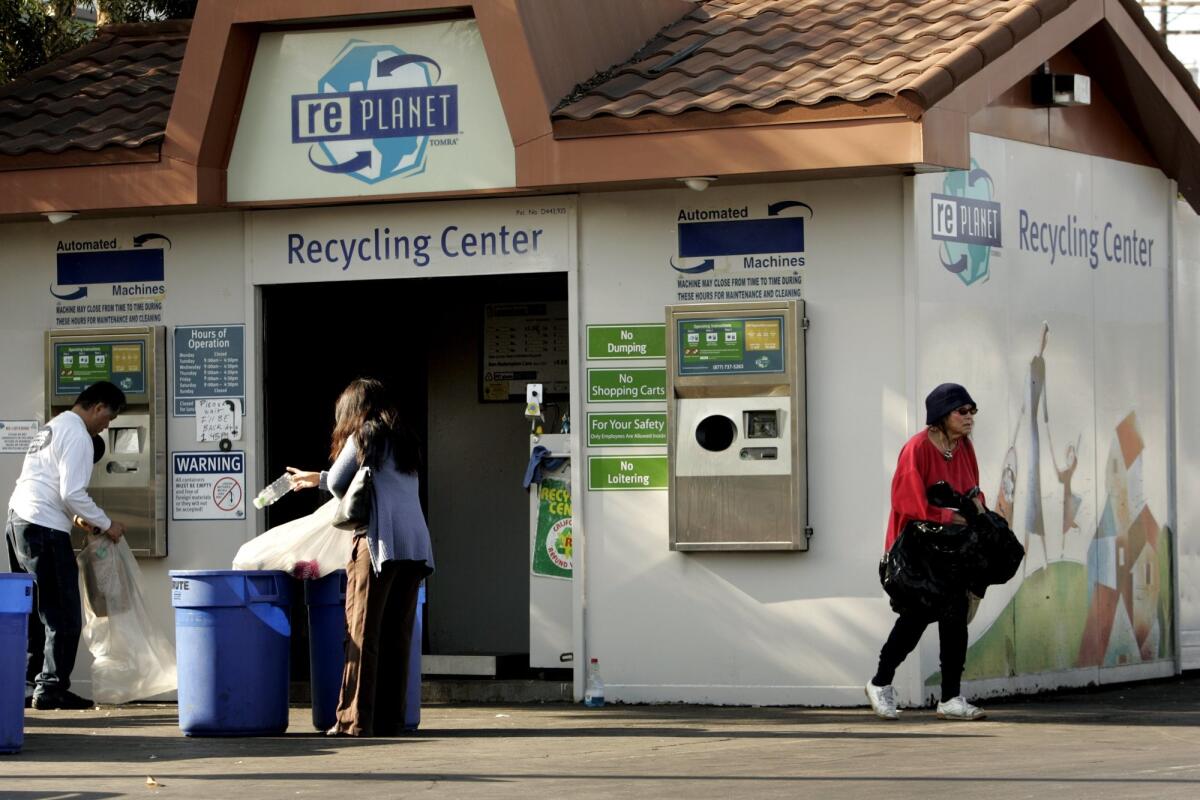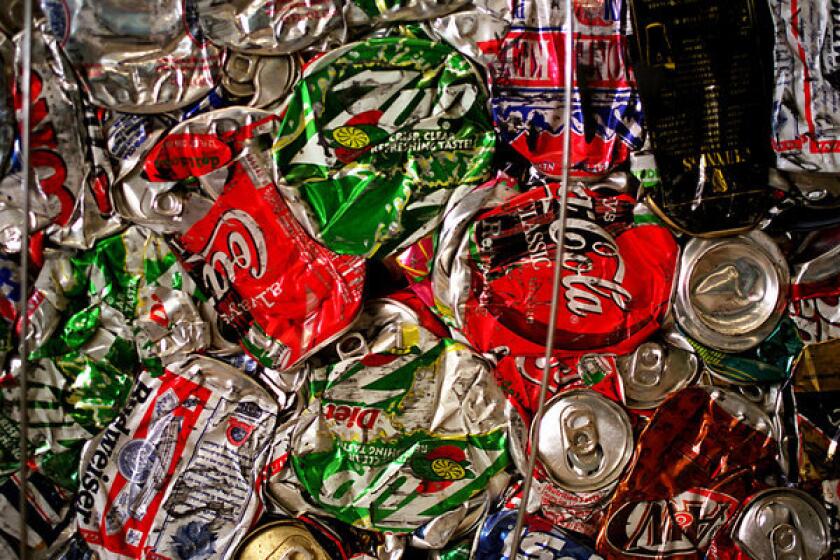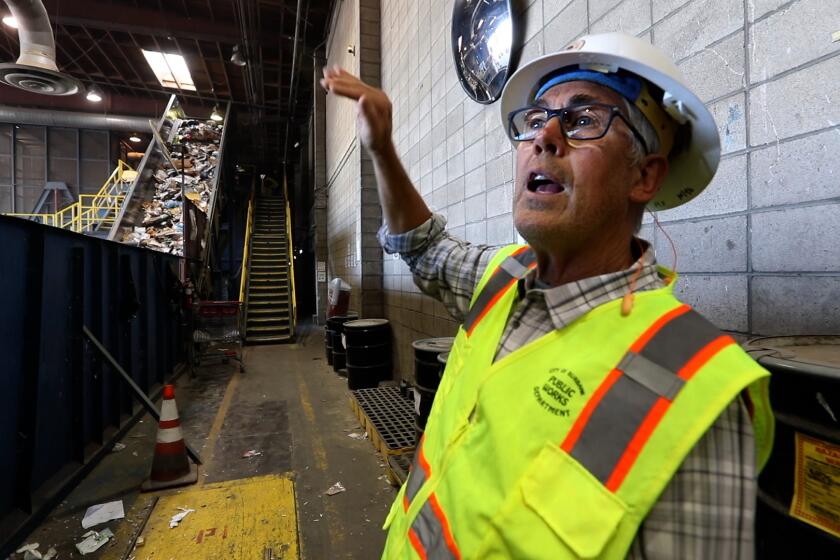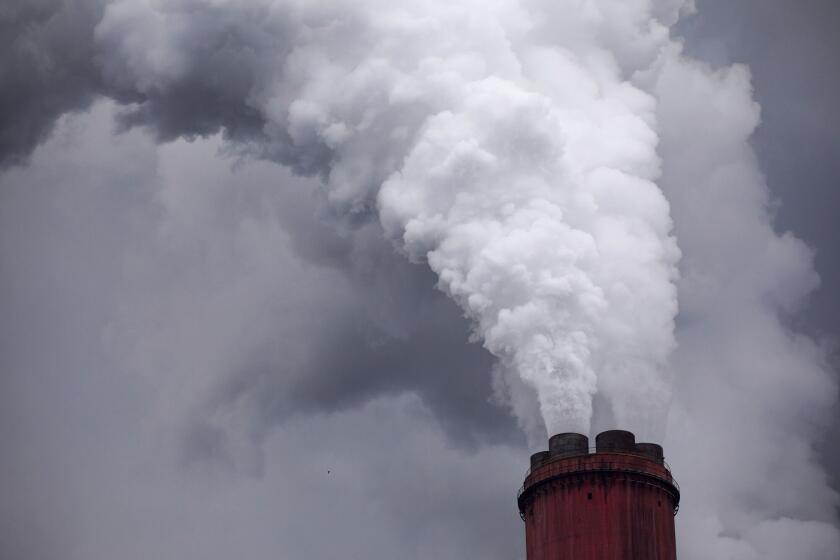Beverage makers have dodged California’s recycling crisis. That may soon change

- Share via
Across California, can and bottle redemption centers have closed. Consumers struggle to find places to get nickels and dimes for their containers. Supermarkets are obliged to redeem cans and bottles not deposited elsewhere. Trash companies take the remainder.
Standing apart in California’s recycling crisis are drink manufacturers. They have never been required to find a permanent repository or reuse for the billions of bottles and cans they produce. California’s 3-decade-old “Bottle Bill” — the law that seeks to boost recycling by putting a 5- or 10-cent bounty on most cans and bottles — has left that work to everyone else.
For the record:
9:49 p.m. Jan. 15, 2020A previous version of this article mistakenly said the redemption rate for the California Redemption Value program was 68%. That figure reflects the share of CRV payments made to customers at recycling centers.
That soon could change. This year, some in the state Legislature want to overhaul the Bottle Bill. On Wednesday, a state Senate committee is slated to hold hearings on a bill that could make beverage manufacturers more responsible for helping consumers recycle, and also extend the Bottle Bill provisions to wine and liquor makers.
The legislation comes after more than half of California’s recycling centers have closed in the last six years, even as residents register their alarm about waste fouling the environment.
Forty-five of Los Angeles County’s 88 cities have no recycling centers. None are left on Los Angeles’ Westside. San Francisco has only four centers to serve nearly 900,000 residents. And Sacramento suburbs like Carmichael do without.
The recycling centers have a particularly hard time in high-rent areas. “West of the 405 [Freeway] there are now no centers,” said Susan V. Collins of the Culver City-based Container Recycling Institute. “Is somebody in Malibu really supposed to drive all the way to Inglewood to redeem their cans and bottles?”
When California’s largest operator of recycling centers went out of business last week, the state lost nearly one-fifth of its redemption centers.
The breakdown has inspired calls for reform of a once-groundbreaking program and a proposal that beverage makers — rather than consumers or retailers — take the lead in designing a revamped container-recycling program.
The push to fix the Bottle Bill comes at a time when lawmakers will also consider forcing drink makers to increase the use of recycled plastic in their bottles. The clamor for action is strong because of intense media attention on plastic pollution and its damaging effects on the ocean and sea life.
“The state can no longer put off solving this ever-growing crisis,” Assemblyman Phil Ting (D-San Francisco) said last week in introducing a bill he said will strive to prop up struggling recyclers and demand greater reuse of plastic by the beverage industry.
In signing an interim repair to the recycling system last year, Gov. Gavin Newsom pledged that he was looking for a “comprehensive solution for this program.” California’s Environmental Protection secretary, Jared Blumenfeld, said he supports the idea of “extended producer responsibility” — making manufacturers ultimately responsible for the containers they produce — though the details of such systems are critical.
On Wednesday, a state Senate committee is scheduled to review a proposal by Sen. Bob Wieckowski (D-Fremont) to make two fundamental changes. One would require drink makers to build a recycling program, one that ultimately would be more convenient for consumers. The other would make bottles for wine and distilled liquor subject to the California Redemption Value rules.
Wieckowski’s Senate Bill 372 seeks to mimic Oregon’s recycling law. That state requires almost all stores to take back and pay the state’s 10-cent-per-container reimbursement. The nearly 50-year-old law also created the Oregon Beverage Recycling Cooperative, an agency that helps retailers band together to open larger redemption centers that can redeem hundreds of cans and bottles at a time.
Oregon recently enhanced convenience again with “BottleDrop Express” kiosks. Customers can leave bags filled with a mix of aluminum, glass and plastic containers. Without waiting, they get redemption money deposited electronically into their accounts.
Wieckowksi said his proposal “eliminates carve-outs and requires all industry stakeholders to play on the same field. Many in the industry already participate in similar programs outside of California. There is no reason we cannot create one here.”
The proposal appears to have broad support among consumer and environmental groups. Soda, beer and water bottlers, which have helped create recycling programs in Canada and Europe, have signaled they might be open to such a program in California.
But activists who have watched past reform efforts worry that the addition of liquor and wine bottles will draw stiff opposition from those interests. And recycling companies want more done to help them in the short run.
The problems with the CRV program became undeniable last August, when the largest recycler in the state, Ontario-based RePlanet, closed all 284 of its centers. Additional shutdowns have left California with 1,208 recycling centers, fewer than half the 2,578 centers that were in operation at the end of 2013.
Red ink sank many recyclers as the prices for scrap aluminum and plastic declined, while state payments meant to cover a portion of their operating costs did not keep up with their actual expenses. (The money to support the centers comes from bottle deposits paid by consumers that are never collected.)
The drooping price of aluminum has been particularly problematic. Recyclers that once got 80 to 90 cents per pound for aluminum cans now get a little more than 40 cents. “That was the meat that was on the bone, and with the scrap price dropping so much there is no way to recoup that at all,” said Jeff Donlevy, general manager in the East Bay for Ming’s Resources, a company that redeems and processes containers into new bottles.
Prices for recycled plastic also dipped sharply, in part as a result of China’s decision to stop accepting imports of the material from the U.S. and other countries. The Chinese said the imported plastic was contaminated with other materials.
California’s recycling industry has struggled since China banned imports of plastics and other material. Experts say changes are vital to overcome a waste glut.
On the expense side, many recycling centers have also been stretched thin as they ship containers long distances and have to pay higher wages, with California’s minimum wage now reaching up to $13 an hour.
“The biggest problem California’s system faces is an outdated state payment formula that results in significantly inadequate processing payments to redemption centers,” said Collins, the recycling activist. “That prevents them from remaining solvent.”
After a yearlong investigation, the nonprofit Consumer Watchdog published a study of the California system in November, concluding that the redemption program would “collapse without fundamental reform.”
The recycling rate for the California Redemption Value program has declined from 85% in 2013 to 76% in 2018. That includes cans and bottles placed in blue curbside bins. But that sort of recycling already is frowned upon by bottlers, who find that broken and soiled cans and bottles often aren’t fit for reprocessing.
Consumer advocates say the disappearance of recycling centers has meant that the CRV charges — 5 cents for most containers, 10 cents for those larger than 24 ounces — often go unclaimed. That effectively makes the CRV a tax, says Consumer Watchdog, which estimated that Californians recover only about half of the extra nickels and dimes they pay for beverages. The Department of Resources Recycling and Recovery, or CalRecycle, said that 68% of the redemption payments made went to customers at recycling centers.
With centers closing, California law envisions supermarkets and other retailers stepping up to redeem cans and bottles. But many don’t. An audit by Consumer Watchdog found that up to two-thirds of stores won’t complete the transactions, leaving many customers with no easy way to get their money back.
The state tried to increase pressure on retailers to take back empties in December, when it proposed a record $3.6-million penalty against the CVS pharmacy chain after dozens of its stores declined to redeem cans and bottles. CVS has not said publicly how it will respond.
But Consumer Watchdog said stores remain in a bind because the California law made them the ultimate recyclers while leaving a “gaping hole” by not clarifying how they should dispose of the cans and bottles. That leads some markets and stores to simply trash the containers, the consumer group said.
Wieckowski’s bill envisions a four-year period in which drink makers and distributors design a new system. They would establish a Beverage Container Stewardship Organization by October 2021 and submit a recycling plan to CalRecycle by the following spring. By 2023, the state agency would set up regulations to transition from the current system to the new one. The new program would launch in January 2024.
In the meantime?
Consumer advocates said improved financial support will be needed for recyclers. The operators agreed. They note that the state fund, built with unredeemed can and bottle deposits, has grown to $309 million. It is projected to increase to $358 million by the end of the current fiscal year. Recycling companies say some of that money should go to provide support of the remaining recycling centers and encourage others to reopen.
“Without quick action,” said Donlevy, the Hayward-based recycler, “more recycling centers will probably close.”











